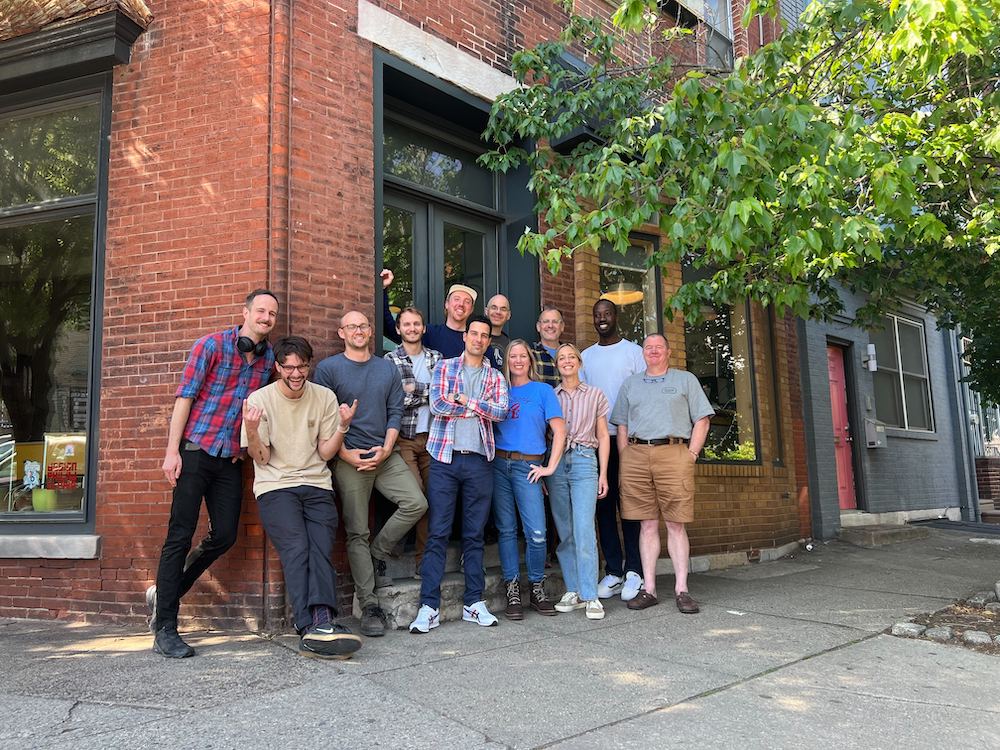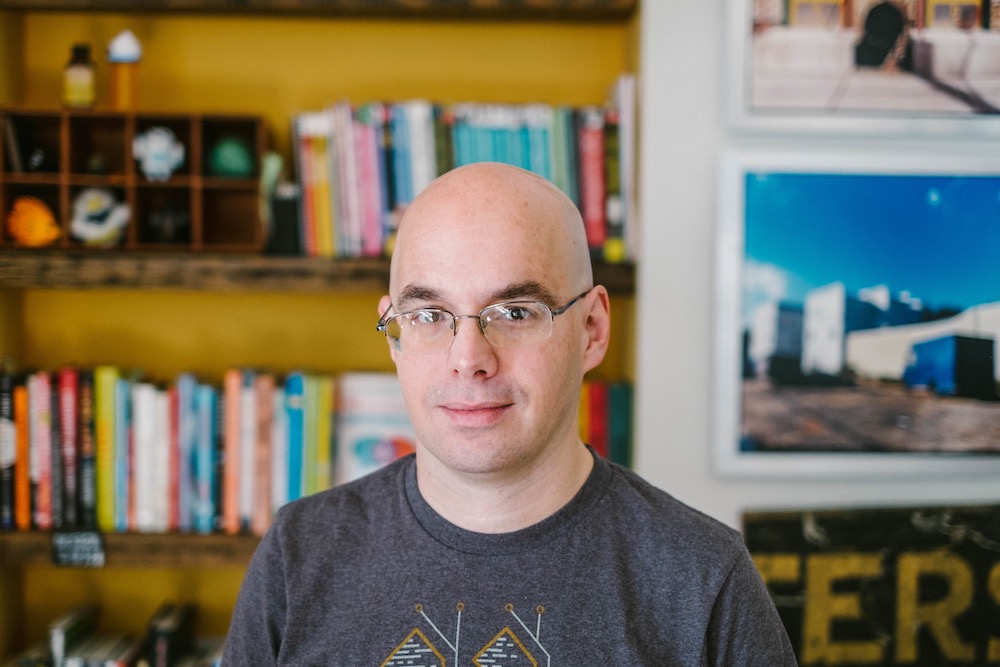Currently CTO of South Philly-founded Apostrophe Technologies, he’s much more focused on building than demolition. He describes his role as “25% ‘business cat emoji,’ 25% ‘software architect,’ 25% ‘mentor’ and 25% ‘JavaScript line cook.’” That mix keeps him busy, although becoming a leader and manager has taken some adjustment.
“For a long time I’ve resisted dialing back my hands-on role as a developer,” he told Technical.ly. “But lately I’ve come to understand that creating new technical designs for others to follow is like programming in a very high-level language. What should we call that language? ‘Persuasion?’ Maybe ‘consensus’ is a better word.”
The Germantown resident and biking enthusiast has a history with tech going back more than 30 years, touching on diverse projects such as biology visualization, audio streaming and the creation of the PNG image format. We checked in with him to find out how those experiences led him to his present role, why he values the culture at Apostrophe and what he’d say to those just beginning their tech journey.
###
How did you first get interested in a career in tech?
As a small child I visited the Boston Museum of Science. AT&T was a sponsor, and they had a “computer” in the basement that the public could experiment with. Really all you could do was interact with it through a touch-tone phone keypad. I was absolutely enthralled.
As the first personal computers popped up, it became physically impossible for my parents to drive past a Radio Shack without stopping to let me mess around with BASIC on a TRS-80 Model III or Color Computer.
Eventually my parents purchased a series of early personal computers for the family, and I definitely had a leg up on computer science by the time I hit college. I’m mindful of the privilege involved in that statement, and of course forever grateful to my parents.
I programmed lots of games, but what really stuck with me was my experience coding a computer bulletin board, or BBS, which was a popular pre-Internet way for people to get online and communicate. Literally one user at a time would dial into a single phone line, post messages, play games and chat with the system operator, which was me. The experience of moderating forums, talking to users and handling disputes taught me a lot about what it means to be a decent human and express your ideas constructively. That led to a strong interest in popularizing access to the technology for others. It was a very idealistic time.
Where did you go to school, and what did you study? How did that prepare you for your current career?
I went to the University of Delaware, where I studied computer science and English literature. Fortunately, UD provided just about everyone with email and encouraged people to experiment with what would soon be known as the internet.
At one point in college I dropped computer science as a major altogether before having an epiphany: Poets can have day jobs. Heck, poets should have day jobs.
What was your first tech job, and what did you think of it at the time?
My first tech job out of college was at Cold Spring Harbor Laboratory, where the DNA double helix was first discovered. I worked on software for 2D gel electrophoresis, which is a way of visualizing the differences between different cells. I was fortunate to have a wonderful boss and the opportunity to make a tiny difference in medical research.
But the really cool algorithm that matched up the pictures of the cells wasn’t written by me, it was written by a brilliant biologist who was also a self-taught programmer. Our job was to define clear interfaces around his work and integrate it into a maintainable application for researchers. That taught me a lot about software architecture and working with other developers in general.
Somewhere along the way, we started playing with the first web browsers, and I made an offhand remark that I could probably put those biology visualizations on the web. We laughed at the time.
How did your career progress from your first tech job to your current role?
I moved to Seattle in ’93, like the rest of the cool kids, and lived off my savings for a while, hanging out in the spoken word scene and looking for a job. At some point, my old boss from Cold Spring Harbor reached out to ask if I was serious about putting those biology visualizations on the web, and I said, “Sure, why not?” So I worked remotely from Seattle for quite a while. This was very early; I was telecommuting on a 14.4kbps modem.
While working on that project, I discovered the official Frequently Asked Questions list about the World Wide Web hadn’t been updated in a while, and asked if I could take over. Nat Torkington said yes, and I became a little bit nerd-famous for about a decade.
I also created early web analytics software, as well as a popular shareware application for editing clickable “imagemaps,” a very early way to achieve interactivity in a web application. Because this was so early in the history of the web, everything I did seemed to reach a large audience automatically because there was only so much out there and everyone was hungry for more.
That small-web effect led me to meet Rob Glaser, who invited me to become the first developer at RealNetworks. There we built RealAudio, the first consumer-friendly solution for Internet radio.
Around that time, there was a crisis on the Internet. Suddenly our precious GIF files were under threat! Those mustache-twirling villains at Unisys had just discovered that GIF files violated their patents, and they wanted license fees.
Instantly a debate over how to replace GIF started on the comp.graphics USENET newsgroup. There were many proposals, but a lot of them were “my way or the highway” proposals: “Obviously we should do it THIS way.” So I posted my own proposal, which was more of an open-source outline with “INSERT YOUR BETTER IDEA HERE” appearing as often as necessary.
People liked that, and a committee soon formed to create what became known as the PNG image format. I was appointed “benevolent dictator” and edited many drafts of the specification. But of course there were many other contributors. So I prefer to call myself the “instigator” of the PNG file.
I really enjoyed working on PNG as well as on the WWW FAQ, and I liked the idea of being my own boss. So in 1995 I landed a book deal, for “CGI Programming in C and Perl,” left my job at RealNetworks, and lived off the advance while I finished the book and turned my web analytics and imagemap applications into serious software I could earn a living from.

How did that work lead you to Philadelphia, and Apostrophe?
So that was the start of my own company, and I worked for myself until 2010 or so, moving to Philadelphia in 2002 to be closer to family.
Working for myself had definite perks, but in the long run I found it a bit limiting and rather isolating as well. It’s hard to grow in your speciality when you have to do a little bit of everything. Also my own company had shrunk from three people to just one and I was a bit stir crazy.
So around 2010 I found myself sitting in Benna’s Cafe in South Philly, next to Geoff DiMasi of P’unk Avenue, the longtime Philadelphia design firm. He said, “Yeah, we need an experienced software developer,” and I said, “Yeah, I need a job,” and we both said “Oh well” and then “Waiiiiit a minute,” and I found myself with a job around the corner from Benna’s.
ApostropheCMS evolved from our work at P’unk Avenue. We were building websites with a variety of frameworks, always making the same customizations to content management systems we didn’t quite like. And one day I gave voice to something we were all thinking: “We can make a better content management system and open-source it for the community.”
So I’m grateful to Geoff, and to Apostrophe CEO Alex Gilbert, for the opportunity to lead that effort on the software side.
Eventually in 2019 we spun Apostrophe out of P’unk Avenue, to give proper attention to all of the opportunities that arose to serve different types of customers, and allow P’unk Avenue to follow its own arc.
How would you describe the work environment and culture at Apostrophe?
Apostrophe is a fully remote company, but we still have plenty of Philly in our DNA, with about half the team in the greater Philadelphia area. We also have a large contingent in France as well as folks scattered around the US. One team member is in full techno-vagabond mode, currently working from South America.
Twice a year we bring everyone together in our tiny South Philly office and indoctrinate everyone with as much Philly sports swag as possible. Of course, Philly is also a foodie town, and we don’t skimp there either. I’m delighted that one of my French teammates has become a serious bagel aficionado since his most recent visit.
Because we’re fully remote, we can’t just “look around to see if people are working.” So we work harder to instill trust, lead by example and measure real productivity in terms of meaningful goals. I think that’s worked out well for us.
Apostrophe isn’t a design-first, developer-first or marketing-first company. We try to value these things equally. That’s important at a company that builds open source tools and also focuses on creating in-context, intuitive editing experiences.
What advice would you give to someone interested in starting their tech career?
Tinker. Experiment. Play. Try stuff out. Do projects on your own and with friends. Volunteer. Join Code for Philly, and be that person who sticks it out and finishes features. Don’t be afraid to build stuff that doesn’t work at first. You never know what will help you out down the line.
Of course, all of that requires free time, which is difficult to find. If you don’t have the privilege of starting young, my advice is to try to carve out as much time as you can to recreate that playful environment around technology and programming. For me, that means no video games and a lot less television. I realize your mileage, resources and priorities may vary, as mine have at different times in my life.







